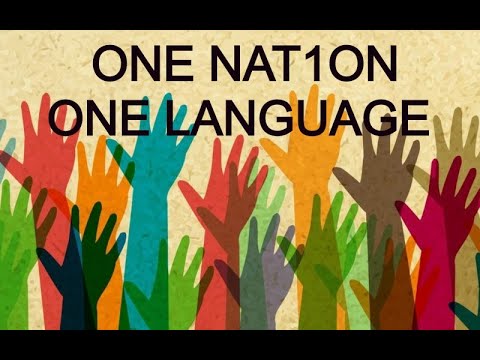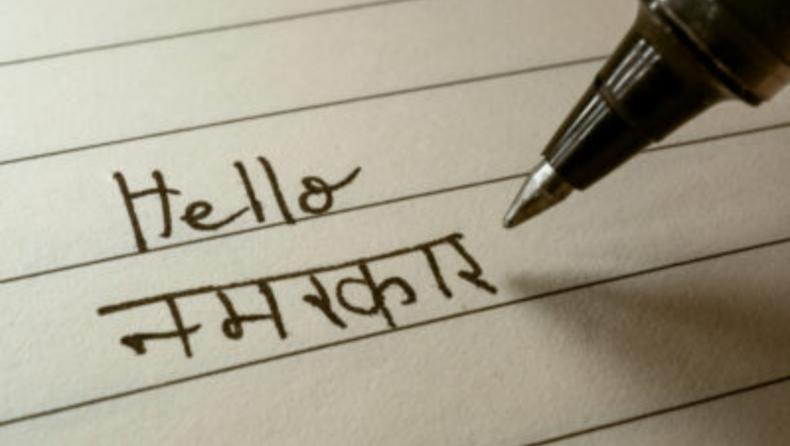The question of national language in India is perhaps the most controversial question. Even in the Constituent Assembly, no debate was as spicy, as controversial as that of the debate on language. This includes the debate on Uniform Civil Code, Land reforms, Ban on cow slaughter, Directive Principles of State Policies and many more. A strange interruption occurred on the second day itself on 10thDecember 1946 where RV Dhulekar declared that those members of the house who did not know Hindustani language were not eligible to be part of the assembly. The need for a national language started even before the independence. The leaders of the nation knew that it would be near impossible to satisfy everyone, but they were going to try.

Congress and Gandhi had started campaigning for the cause of “Hindustani” as the obvious choice for the national language of India. Defending Hindustani, Gandhi had said “Hindustani neither needs sanskritized Hindi nor Persianized Urdu. It should be a sweet combination of both. Hindustani should freely be able to admit words from other native languages and foreign languages too, provided it mixes well with the language” regarding Hindustani. It was decided in the 1947 fundamental rights sub-committee meeting that Hindustani would be the national language and English would be retained for as long as the union wishes. This was all changed when in the congress party`s meeting, members voted to remove Hindustani and replace it with Hindi. 63 members voted for Hindi and it won. Many say this decision was also influenced due to Pakistan declaring that Urdu would be its national language. Due to congress`s vote, the members of the drafting committee had to replace “Hindustani” to “Hindi” throughout the draft constitution.
Thus emerged the power of languages. The mere question of it plunged the assembly and on a whole, India into chaos. The southern members present in assembly highlighted how they were being subjected to threats and protests, some going as far as to say “Let Rajagopalachari die, let Subarian die. Let Hindi die and let Tamil live.” Protests erupted all around the country. The mere rumour that Hindi would be imposed on them made peoples language dearer to them and made them hate Hindi. This led to the formation of Munshi-Ayyangar committee which sought to give a satisfactory solution to this problem. The committee had proposed that Hindi would be the national language, in the Devanagari script with international Indian numerals provided that English continued for the first 15 years of our independence. This was eventually accepted by the ardent if not fanatical supporters of Hindi.
The adoption of Hindi or rather somewhat Sanskritized Hindi brought forth problems. It was rather hard to understand and was too “rigid” which did not leave place for new words to be adopted into it. Pandit Nehru after reading the Hindi translation of the draft constitution is said to have remarked that he couldn’t understood even a single word of it.
Cut to present, Amit Shah the home minister had reignited this matter back in 2019. He had said on Hindi diwas of that year that the time has come to proclaim Hindi as the national language of India but not at the cost of regional languages. He claimed that Hindi is capable of uniting India. Within mere minutes of this statement a war of words erupted, from congress and some other parties opposing this statement saying that it could never be possible. The question which arises here is whether the time is indeed right for Hindi to come on as national language. The draft national educational policy had a recommendation regarding making it mandatory to teach Hindi in each and every school. Bengal, Maharashtra, Karnataka erupted into protests. Bhartiya Janata Party’s (BJP`s) own ally had criticised this. The protests were so powerful that the ministry had to make amendments to remove the recommendation. It was later re-uploaded.
Another major thing is the matter of including Hindi in the official languages of the UN. This proposal was put forward long ago but is still pending. Many consider that this will be a prominent step towards India becoming “Vishwa Guru.” Shashi Tharoor had opposed this saying the matter shouldn’t even be touched as in future if the Prime Minister comes from one of the southern states, and they can’t speak Hindi, how would they give speeches in the UN?
The 2001 census highlights that 41% of people speak Hindi as their native language. If Hindi is declared as the national language, wouldn’t the rest 59% be at a more or less disadvantage? Additionally, what will happen to the native languages? Would they be discouraged as it is being done in China? Wouldn’t that be a black mark on our idea of “Unity in diversity?” The statistics already say that almost 220 languages since 1961 have died or have been endangered. It is projected that another 150 languages would be lost in the next 50 years. Nehru had once said “The mere act of you taking it away makes it dear to me.” Perhaps this and other reasons like the death of certain culture is the reason why we haven’t found a perfect solution.
It is argued that a national language will lead to a more united country. Ernst Renan a French philosopher had said in his lecture “What is a nation?” that a nation is not formed by common language, race religion or territory. He had said “A nation is a culmination of a long past of endeavours, sacrifice and devotion…. To have common glories in the past, to have a common will in the present, to have performed great deeds together, to wish to perform still more, these are the essential conditions of being a people.” Therefore, there need not necessarily be a national language for there to be national unity.
On the other hand, the lack of Hindi as national language will create space for English to take over. Nehru in one of his speeches proclaimed that no country could take millions of its citizens far with a foreign language as its national or official language. Many agree with this due to which they push for Hindi to become the national language. The question of language is crooked. There is never a right answer. We must only hope that there would be a solution in the future, perhaps a new language on the lines of Hindustani which is not too rigid to solve our problem.













